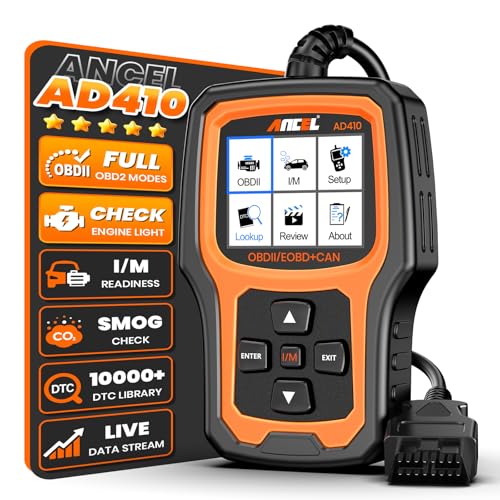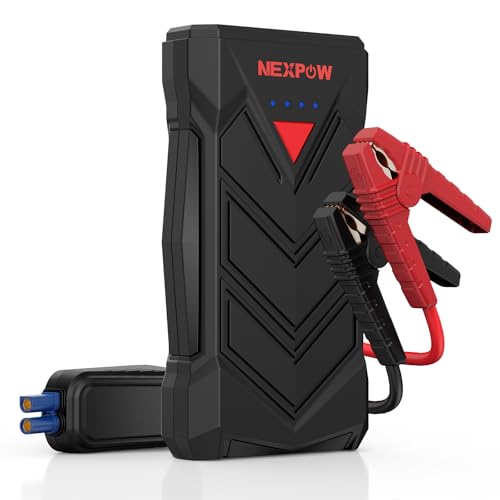That sudden, frustrating jerk when you press the gas pedal feels alarming, doesn’t it? This lurching or stuttering motion is your car’s way of telling you something isn’t right, and figuring out the source can feel overwhelming. You’re left wondering if it’s a simple fix or a sign of a major, expensive problem.
A car jerking during acceleration is typically caused by a problem in the fuel, ignition, or transmission systems. Common culprits include clogged fuel injectors that disrupt fuel flow, worn-out spark plugs causing engine misfires, or low transmission fluid leading to rough gear engagement.
This comprehensive guide will eliminate the guesswork. Leveraging a detailed analysis of common vehicle faults, we will walk you through a systematic diagnosis of why your car jumps when you accelerate. We’ll explore everything from the most common and easy-to-fix issues to the more complex mechanical problems, helping you understand the symptoms, identify the cause, and determine the right next steps.
Key Facts
- Common Culprit: Dirty or clogged fuel injectors are one of the most frequently identified reasons a car jumps when you accelerate, as they prevent a consistent spray of fuel into the engine.
- Simple Fixes Exist: Many causes, such as worn-out spark plugs or a dirty air filter, are often inexpensive and relatively easy fixes that can be part of routine maintenance.
- Telltale Smell: A failing or clogged catalytic converter can often produce a distinct “rotten egg” smell from the exhaust, providing a clear sensory clue to the problem’s origin.
- Safety First: This issue is more than a minor annoyance; it can be a significant safety concern that should be addressed promptly to ensure safe vehicle operation and prevent further damage.
- Diagnostic Tools Help: Professional mechanics often use OBD-II scanners to check for Diagnostic Trouble Codes (DTCs), which can pinpoint specific sensor or system failures causing the jerking sensation.
Why Is Your Car Jerking When You Accelerate? A Diagnostic Guide
When your vehicle jumps, jerks, or stutters as you press the accelerator, it’s a clear signal that an underlying issue exists within one of its complex systems. This sensation, which can feel like a brief hesitation or a violent lurch, indicates a disruption in the smooth delivery of power from your engine to your wheels. It is not something to ignore. Addressing the problem promptly is crucial not only for your peace of mind but also to prevent what might be a small issue from escalating into a costly repair. The problem almost always stems from a fault in one of four key areas of your vehicle:
- Fuel System: Responsible for delivering the right amount of gasoline to the engine.
- Air Intake System: Manages the air your engine needs to mix with fuel.
- Ignition System: Creates the spark that ignites the air-fuel mixture.
- Transmission & Drivetrain: Transfers the engine’s power to the wheels.
Understanding how these systems work together is the first step in diagnosing why your car jumps when you accelerate. This guide will break down the most common failures in each of these areas, helping you narrow down the possibilities.
The Top Culprits: Fuel and Air System Problems
Issues with the fuel and air systems, such as dirty fuel injectors, a clogged fuel filter, or a faulty mass airflow (MAF) sensor, are the most common reasons a car jerks because they disrupt the precise air-fuel mixture needed for smooth combustion. Your engine is essentially a sophisticated air pump that requires a perfectly balanced diet of air and fuel to generate power. When this balance is thrown off, the engine can sputter, hesitate, or misfire, which you feel as a distinct jerk or jump, especially when you demand more power during acceleration.

Many of these issues start small and worsen over time. A slightly dirty filter might only cause a minor hesitation, but as it becomes more clogged, the jerking will become more pronounced. Below is a breakdown of the most frequent offenders in the fuel and air systems.
Pro Tip: A dirty air filter is one of the easiest and cheapest fixes. It’s worth checking this component before assuming a more serious problem.
| Component | Why it Causes Jerking | Common Symptoms | Typical Fix (DIY or Pro?) |
|---|---|---|---|
| Fuel Injectors | Clogged with contaminants, they can’t spray fuel evenly, leading to an improper air-fuel mixture and misfires. | Loss of power, rough idle, poor fuel economy, engine misfires. | Pro (Requires special tools for cleaning or replacement). |
| Fuel Filter | A clogged filter restricts fuel flow, starving the engine of fuel when you demand more power (like accelerating). | Hesitation, sputtering, difficulty starting, loss of power uphill. | DIY (On many vehicles, but can be difficult to access). |
| Air Filter | A dirty filter chokes the engine by restricting airflow, creating a fuel-rich mixture that burns inefficiently. | Sluggish acceleration, reduced fuel economy, black smoke from exhaust. | DIY (One of the simplest maintenance tasks). |
| Mass Airflow Sensor | A dirty or failing MAF sensor sends incorrect air measurement data to the ECU, causing the wrong amount of fuel to be injected. | Rough idle, stalling, poor acceleration, black smoke. | DIY (Can often be cleaned; replacement is straightforward). |
Clogged Fuel Injectors & Filters
Clogged fuel injectors lead to inconsistent fuel spray and misfires, while a clogged fuel filter restricts overall fuel flow, both causing hesitation and jerking. Think of your fuel injectors as tiny, precise nozzles. Over thousands of miles, deposits from gasoline can build up, disrupting this fine spray pattern. When that happens, some cylinders get less fuel than others, causing an unbalanced combustion process that you feel as a stutter or loss of power.
The fuel filter, on the other hand, acts as the gatekeeper, preventing rust, dirt, and other debris in your gas tank from reaching the sensitive injectors and engine. When it becomes saturated with contaminants, it simply can’t let enough fuel pass through, especially when the engine needs it most.
- Symptoms of Clogged Fuel Injectors: The jerking may be inconsistent at first and is often accompanied by a rough idle and noticeably worse gas mileage.
- Symptoms of a Clogged Fuel Filter: The car might feel fine at a constant speed but will hesitate or sputter dramatically when you try to accelerate hard or drive up a hill.
Malfunctioning MAF Sensor & Airflow Issues
A faulty MAF sensor sends incorrect air measurement data to the car’s computer, while a dirty air filter physically blocks airflow, both leading to a poor air-fuel ratio and jerking. The Mass Airflow (MAF) sensor is a critical component that tells your engine’s control unit (ECU) exactly how much air is entering the engine. Based on this incorrect data, the ECU calculates how much fuel to inject. If the sensor is dirty or failing, that calculation will be wrong, leading to a mixture that is either too rich (too much fuel) or too lean (not enough fuel), both of which cause poor performance.
Another common issue is a vacuum leak. This occurs when unmetered air enters the engine through a cracked hose or a bad gasket somewhere after the MAF sensor. This extra air leans out the air-fuel mixture, causing rough idling, poor acceleration, and a distinct jerking sensation.
A vacuum leak allows unmetered air into the intake manifold, disrupting the carefully balanced air-fuel ratio. This leads to a lean condition, where there is too much air and not enough fuel for proper combustion, causing the engine to stumble and jerk.

Quick Fact: Your engine needs about 14 times more air than fuel for proper combustion. Any disruption to that airflow can be felt immediately.
Spark & Ignition System Failures
Ignition system problems, primarily worn-out spark plugs or faulty ignition coils, are a leading cause of jerking during acceleration. These components fail to properly ignite the fuel, leading to engine misfires. Even with the perfect air-fuel mixture, your engine can’t produce power without a strong, consistent spark to ignite it. The ignition system is responsible for generating and delivering a high-voltage spark to each cylinder at precisely the right moment. A failure at any point in this chain reaction—from the coil to the plug—will result in an engine misfire, which is the primary source of the jerking or stuttering sensation.
When a spark plug fails to fire, the unburnt fuel and air in that cylinder are simply pushed out during the exhaust stroke, creating a momentary loss of power. When you’re accelerating, this sudden hiccup in power delivery becomes very noticeable.
Ever tried to light a grill with a faulty igniter? A weak spark plug causes a similar problem inside your engine’s cylinders.
From our experience analyzing countless repair logs, the ignition system is one of the first places to investigate when a car jumps when you accelerate. The components are designed to be replaced as part of regular maintenance, making them a very common source of trouble. Here is the logical order to check them:
- Worn-Out Spark Plugs: Spark plugs have a finite lifespan. As the electrodes wear down, the gap widens, requiring more voltage to create a spark. Eventually, the spark becomes too weak or inconsistent, leading to misfires. Fouled or damaged plugs can also be the culprit. The good news is that this is often an inexpensive fix.
- Faulty Ignition Coils: The ignition coil transforms the car’s 12-volt battery power into the thousands of volts needed to create a spark. A modern engine typically has one coil per cylinder. If a coil starts to fail, it won’t be able to provide a consistent, strong spark, causing misfires in that specific cylinder.
- Damaged or Worn Ignition Wires: In older vehicles or those with a distributor, these wires carry the high-voltage current from the coil(s) to the spark plugs. If a wire is cracked, corroded, or damaged, the electrical current can be lost before it reaches the plug, resulting in a weak spark or no spark at all.
Deeper Mechanical Issues: Transmission and Engine Mounts
Jerking can be caused by mechanical failures like a slipping transmission due to low fluid or a worn clutch, or by broken engine mounts allowing the engine to move excessively during acceleration. While fuel and spark issues are more common, the problem can sometimes be purely mechanical. These issues often feel different—sometimes more like a shudder, a clunk, or a violent lurch rather than a rapid stutter. These problems relate to how the power your engine creates is physically transferred to the wheels and how the engine itself is secured within the vehicle.
If you’ve ruled out the more common fuel, air, and ignition problems, it’s time to consider these more serious mechanical possibilities.
Warning: Transmission problems can be complex and expensive to fix. If you suspect an issue with your transmission, it is crucial to have it inspected by a qualified mechanic. Continuing to drive can lead to catastrophic failure.
Transmission Problems
Low or dirty transmission fluid is a common cause of jerking in automatic transmissions, leading to rough shifting and slipping. A worn clutch can cause similar issues in manual cars. The transmission is the critical link between the engine and the wheels. Its job is to manage the engine’s power through various gears. Any problem within this complex component can manifest as a jerking sensation.
If the jerking happens specifically when the car is changing gears, your transmission is the prime suspect.
- Low or Contaminated Transmission Fluid: Transmission fluid is the lifeblood of the system. It acts as a lubricant, a coolant, and a hydraulic fluid that enables gear changes. When the fluid is low or has broken down over time, it can cause the internal clutches and bands to slip or engage harshly, resulting in a jerking motion.
- Worn Clutch (Manual Transmission): In a manual car, the clutch disc can wear out over time. When this happens, it can’t grip the flywheel properly, causing it to slip under acceleration. This feels like the engine is revving up, but the car isn’t accelerating smoothly, often accompanied by a jerking motion.
- Faulty Torque Converter (Automatic Transmission): The torque converter connects the engine to the transmission. If it malfunctions, it can cause a shuddering or jerking feeling, particularly when accelerating from a complete stop.
- Internal Transmission Faults: More serious issues can include worn-out gears, failing solenoids (which control fluid flow), or other degraded internal components, all of which can lead to rough, jerky shifting.
Worn or Broken Engine Mounts
When engine mounts are worn or broken, the engine itself can lurch during acceleration, creating a strong jerking sensation felt throughout the vehicle. Engine mounts are essentially rubber-and-metal shock absorbers that secure your engine to the vehicle’s chassis. Their job is twofold: hold the heavy engine in place and absorb its vibrations so you don’t feel them in the cabin.
Over time, the rubber can degrade, crack, or break. When a mount fails, the engine is no longer held securely. As you accelerate, the torque of the engine can cause it to have excessive movement, lifting and twisting in the engine bay. This sudden, violent movement is transferred through the chassis, and you perceive it as a loud clunk or a significant jerk. The vibrations at idle will also be much more noticeable.
Blockages in the System: Exhaust & Catalytic Converters
A clogged catalytic converter is a primary cause of jerking from the exhaust system. It creates backpressure that prevents exhaust gases from exiting efficiently, choking the engine and causing a loss of power. Your engine needs to breathe out just as much as it needs to breathe in. The exhaust system is designed to safely and quietly expel the byproducts of combustion. If this system becomes blocked, it’s like forcing the engine to exhale through a pinched straw. This creates immense backpressure, which robs the engine of power and can cause a host of performance issues, including a very noticeable jerking when you try to accelerate.
The most common point of restriction is the catalytic converter. This device is designed to superheat unburnt hydrocarbons and reduce harmful emissions. However, internal components can break down or melt over time, creating a blockage.
Warning Sign: A failing catalytic converter can often produce a distinct “rotten egg” smell from the exhaust.
A malfunctioning Exhaust Gas Recirculation (EGR) valve can also cause similar issues. The EGR valve recirculates a small amount of exhaust gas back into the engine’s cylinders to lower combustion temperatures and reduce emissions. If the valve gets stuck open or closed, it can disrupt the air-fuel mixture, leading to rough idling and jerking during acceleration.
Think of it like trying to exhale through a pinched straw. A clogged catalytic converter does the same thing to your engine.
If your car feels increasingly sluggish and the jerking is accompanied by a loss of overall power and poor fuel economy, a blocked exhaust should be a prime suspect.
To properly diagnose why your car jumps when you accelerate, especially when dealing with potential sensor failures or intermittent issues, having the right diagnostic tool is essential. An OBD2 scanner can read the trouble codes your car’s computer stores, pointing you directly to the source of the problem.
FAQs About a Car Jumping When Accelerating
How do you fix a car jerking when accelerating?
Fixing a jerking car starts with diagnosing the cause. Simple fixes include replacing the air filter or spark plugs, while more complex issues like a bad fuel pump or transmission problems require a professional mechanic. The right fix is entirely dependent on the root cause of the problem. A systematic approach is best:
1. Check the Simple Items First: Start with the easiest and cheapest potential fixes. Inspect your engine’s air filter and replace it if it’s dirty.
2. Inspect the Ignition System: Check the condition of your spark plugs. If they are old, fouled, or worn, replacing them is a common and effective solution.
3. Scan for Codes: Use an OBD-II scanner to check if the vehicle’s computer has stored any Diagnostic Trouble Codes (DTCs). These codes can point you directly to a faulty sensor or system.
4. Consult a Professional: If the problem persists or you suspect a more complex issue with the fuel pump, transmission, or catalytic converter, it is crucial to have the vehicle inspected by a qualified mechanic who has the proper diagnostic tools and expertise.
Is it bad to drive a car that jerks when accelerating?
Yes, it is bad to drive a car that jerks when accelerating. It can be a significant safety concern and continuing to drive may cause more extensive and expensive damage to the engine or transmission. A jerking car can be unpredictable, which poses a risk when merging into traffic or pulling out from an intersection. Furthermore, the underlying cause, such as an engine misfire, can damage expensive components like the catalytic converter over time. It is a safety concern that should be addressed promptly to prevent further damage.
Why does my car feel like it’s jumping when I accelerate at low speeds?
Jerking at low speeds is often caused by faulty sensors like the MAF sensor, worn-out spark plugs that misfire under load, or clogged fuel injectors that disrupt the initial fuel delivery. When accelerating from a stop or at low RPMs, the engine is under a high load, which can expose weaknesses in the fuel delivery and ignition systems. The most common culprits for this specific symptom include:
* Worn-out spark plugs that struggle to produce a strong enough spark under load.
* Dirty or clogged fuel injectors that fail to provide an adequate amount of fuel for the initial burst of acceleration.
* A faulty Mass Airflow (MAF) sensor that sends incorrect readings at low airflow volumes.
* Vacuum leaks that have a more pronounced effect on the air-fuel mixture at idle and low speeds.
My car jerks but there is no check engine light. What could it be?
A car can jerk with no check engine light if the problem is mechanical (like worn engine mounts), related to fluid levels (low transmission fluid), or caused by a restriction (clogged fuel filter) that hasn’t yet triggered a sensor fault. The check engine light typically illuminates only when a sensor reports a reading that is outside of its normal operating range. Many issues that cause jerking don’t immediately trigger a code. Common examples include:
* A moderately clogged fuel filter that restricts flow but hasn’t caused a fuel pressure sensor to trip.
* Early-stage transmission problems, such as low fluid, that cause slipping before a major fault is detected.
* Worn engine mounts, which are a purely mechanical failure with no associated sensors.
* Minor vacuum leaks that the engine’s computer can partially compensate for.
Final Summary: Don’t Ignore the Jerk
When your car jumps when you accelerate, it’s not just a quirk; it’s a critical message from your vehicle that something needs attention. As we’ve detailed, the sensation can stem from a wide range of issues, from a simple clogged air filter to more complex transmission faults. Ignoring this warning sign can lead to decreased fuel efficiency, more significant component failures, and potential safety risks on the road.
By systematically considering the most likely culprits in the fuel, air, ignition, and mechanical systems, you can effectively narrow down the cause. For many drivers, a simple inspection and replacement of maintenance items like spark plugs or filters will resolve the issue and restore a smooth ride.
- The Key Takeaway: A jerking or stuttering sensation during acceleration is a symptom, not the core problem. It is most often caused by a disruption in the engine’s air-fuel mixture, a failure in the ignition system, or a mechanical issue in the transmission or drivetrain.
- Your First Steps: Always start your diagnosis with the simplest and most common fixes. Check your air filter and the maintenance schedule for your spark plugs before assuming a more severe problem.
- When to See a Pro: While some fixes are DIY-friendly, never hesitate to consult a qualified mechanic. For your safety and to prevent costly damage, professional diagnosis is essential for complex issues related to the transmission, fuel pump, or catalytic converter.
Your car is communicating a problem—take these insights and confidently find the source to get back to a smooth, safe ride.
Last update on 2026-01-13 / Affiliate links / Images from Amazon Product Advertising API













![What Car Is Chevy Bringing Back in [year]? New Lineup Revealed 18 What Car Is Chevy Bringing Back in [year]? New Lineup Revealed](https://carxplorer.com/wp-content/uploads/2026/01/What-Car-Is-Chevy-Bringing-Back-in-year-New-Lineup-Revealed-1-1-60x60.jpg)